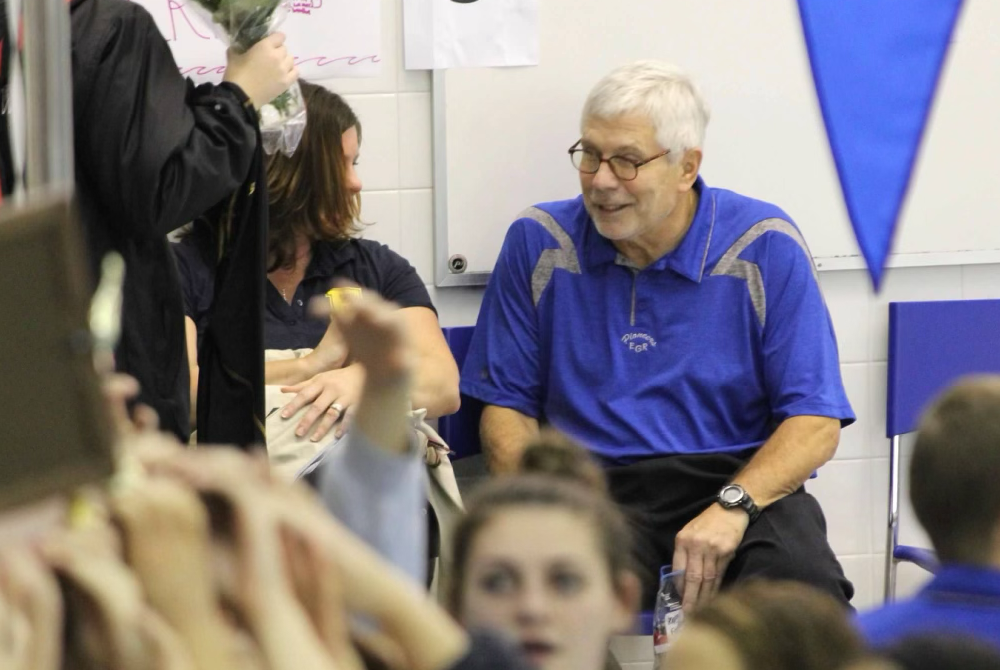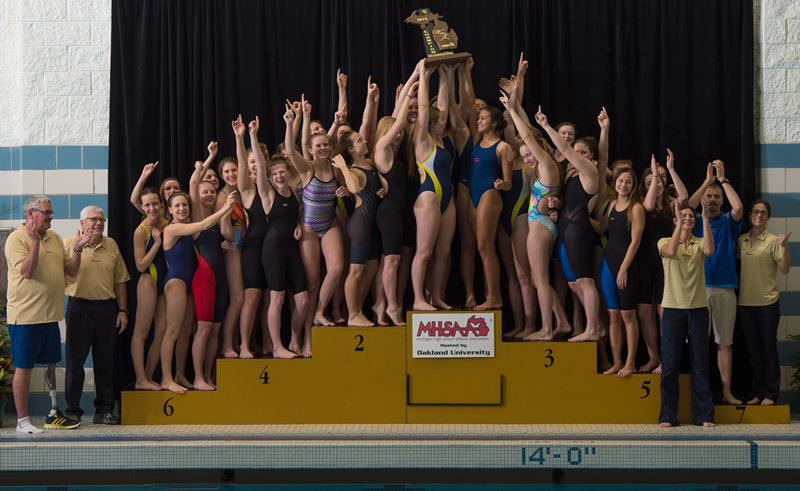
Keep on Coaching
February 1, 2013
By Geoff Kimmerly
Second Half editor
A few weeks ago, I finally got my first chance this season to watch a friend coach his basketball team. After guiding some others at the lower levels, this is his first time running the varsity – something he wasn't sure he wanted to do with a 1-year-old just learning to walk, but a challenge he ended up taking on to the benefit of all those involved.
Simply put, he’s good. I've seen a lot of teams and a lot of coaches over the past 15 years, and although I wouldn't know much of what to do if I were walking the sideline, I felt pretty qualified in telling him I was impressed – even if he didn't buy that I was offering an unbiased opinion. The best news is he’s gone from not sure about this a few months ago to talking about next season.
We know, at least anecdotally, that coaching continues to get more challenging. The time commitment has grown substantially to make running a program a year-round endeavor in a lot of sports at a lot of schools.
That commitment – especially for coaches with children of their own – was a main reason referred to in a New Haven Post-Chronicle story Saturday that noted 23 football coaching openings in Connecticut at one point this offseason. That state has 146 football teams – meaning roughly 15 percent will have new leaders this fall.
And that got me thinking about my friend, about how glad I am he’s given this a shot, and how I've seen so many others either not do so, or not stick around long despite having some pretty nice success.
A study published last winter in Interscholastic Athletic Administration magazine – a product of the National Interscholastic Athletic Administrators Association – noted some predictable results of a study that sought to determine the biggest challenges faced by first-year high school coaches.
The toughest according to the study was balancing the demands of coaching and teaching, experienced by nearly half the respondents – 98 percent of which coached high school teams and 81 percent of which are teachers.
The next six reasons all were noted by at least 30 percent of those in the study – personal fatigue, securing community support, securing and caring for facilities and equipment, parental contact, keeping non-starting players motivated, dealing with schedule interruptions and motivating athletes to achieve consistent, peak performance.
Nothing there is earth-shaking, and most if not all of these challenges are faced by high school coaches regardless of how long they've been in the field. But I got a little more perspective from some of the 32 items that ranked as least challenging to the first-year leaders – keeping in compliance with state and league regulations, dealing with substance abuse issues, teaching sport skills and creating a positive team atmosphere – things that seem most important, and yet appear to be easiest to do. I’m not sure what that tells us – but I think it tells us something.
Click to check out the entire three-page breakdown of the study, plus the researchers’ recommendations to remedy some of what first-year coaches face.
Giving back to Saginaw
I love reading about high-level athletes – like a star-studded group of alums from Saginaw – giving back to where they got their starts.
Pittsburgh Steelers star LaMarr Woodley made a big impact before the start of this school year by donating $60,000 to cover all participation fees for athletes in his former school district. The Saginaw News’ Hugh Bernreuter writes today about how Woodley (Saginaw High), the Philadelphia 76ers’ Jason Richardson (Saginaw Arthur Hill) and former Oakland Raiders standout Stu Schweigert (Saginaw Heritage) have combined to give more than $865,000 back to their home communities.
Bernreuter also mentions the non-monetary contributions of the Golden State Warriors’ Draymond Green (Saginaw High) and former Indianapolis Colts receiver Blair White (Saginaw Nouvel).
Click to read more about it.
Quote(s) of the Week
While rifling through more papers on my desk, I found an article from the Washington Post from Sept. 2011 titled “How high school sports save our schools.” I was drawn to it in part because I spent more than a decade in a newsroom, and it was a piece by a reporter covering education who instead of reporting on school boards and the like, delved into the importance of interscholastic athletics to education as a whole.
He spoke of how participation continues to grow even as resources dwindle, and of data supporting that extracurriculars like sports are more effective than academic classes in teaching leadership, teamwork, time management and “other skills crucial for success in the workplace.” Later, he mentioned a study noting that those who participate in extracurriculars earned more a decade later.
Click here to read the entre piece. These passages struck me most.
“Coaches might be the only faculty members still allowed by our culture and educational practice to get tough with students not making the proper effort. They have the advantage of teaching what are essentially elective non-credit courses. They can insist on standards of behavior that classroom teachers often cannot enforce because the stakes of dismissing or letting students drop their courses are too high. …
“Students do better in activities they choose. If we provide more of them, led by committed adults … that can make a difference. We know the bad news about education. Dropout rates are high. Achievement scores are stagnant. But sports participation is going up, despite pressure to cut it back. Let’s cheer about that and look for a way to draw in more students.”

East Grand Rapids' Briggs to Receive Deserved Spotlight for Half-Century of Swim
By
Dean Holzwarth
Special for MHSAA.com
May 17, 2024
EAST GRAND RAPIDS – When the idea was presented to celebrate his coaching milestone, Milton “Butch” Briggs balked at it.
 The longtime East Grand Rapids swimming & diving coach doesn’t like to be the center of attention, although his teams certainly have been over the last 50 years as he’s established a pair of perennial state powerhouses.
The longtime East Grand Rapids swimming & diving coach doesn’t like to be the center of attention, although his teams certainly have been over the last 50 years as he’s established a pair of perennial state powerhouses.
“He vehemently said, ‘No, we’re not doing this,’” Pioneers assistant girls coach Gwen Barnes said. “But it’s going to be super cool and so deserving. We need to mark this occasion as a community and swimming community. He has influenced so many people and been an active member of the community for a long time.”
On Saturday, the East Grand Rapids Community Foundation and Alumni Association will commemorate Briggs and his 50 years of coaching at the school.
Briggs took over the East Grand Rapids boys swimming & diving program for the 1972-73 season, and the girls program beginning in the fall of 1974. He has coached 102 seasons total, winning 26 MHSAA Finals championships with the girls and 12 with the boys.
Briggs has always wanted the focus to be on his teams rather than himself.
“He is not one who likes the spotlight,” retired Pioneers athletic director Tim Johnston said. “He is a very private man, but it is awesome that this group of alumni, swimmers and parents want to celebrate him.
“He is one of the best coaches I have ever had the opportunity to work with, but to be completely honest, he is a better person and more than just a coach. That is the truth.”
Past EGR swimmer Kris Ward was a member of the first girls state championship team in 1978.
“He had a huge impact on me,” Ward said. “Just from understanding hard work and dedication and being part of a team. Then following it through. He worked with a variety of people on the team and helped us to come together. It was all about life lessons, and he's teaching the kids that while still being successful.”
Briggs also coached Ward’s daughters Alex, Ashley and Abby.
“He was always about connecting with the kids,” Ward said. “My kids were all able to swim for him, and so I had that experience with him in a different way and seeing how he was with all of my girls on the team.
“He starts with connecting with one person and carries that through to make the success better.”
 Barnes, an assistant coach for the girls team the past three years, also swam under Briggs from 1984-87.
Barnes, an assistant coach for the girls team the past three years, also swam under Briggs from 1984-87.
Her teams won four straight Finals championships and never lost a dual meet.
“There were high expectations for us, and despite them being unspoken, we felt it,” Barnes said. “We wanted and felt this desire to do our best on that team each year, and he instilled this culture of commitment and hard work. Every swimmer had different abilities, but he was able to tap into getting us to do our best.”
Barnes has gained a different perspective of Briggs as his assistant.
While she noted that he still displays the same traits as far as his demeanor, sense of humor, kindness and patience, his devotion to the program and his student-athletes also has never wavered.
“Coaching with him as an assistant, you see how much work and time he puts in that goes unnoticed sometimes,” Barnes said. “To maintain that level of commitment for 50 years is pretty remarkable, and he still has this presence when on the pool deck that challenges everybody to do their best. He set the same standard for everyone, and everyone on the team feels important, which I think is cool.
“He weaves in a lot of stories and lessons from over the years and maintains traditions that I think make current teams feel like they are a part of and building onto the history.”
Briggs, who played football and ran track & field in high school, was inducted into the Grand Rapids Hall of Fame in 2009. The EGR natatorium was named after him in 2014.
Briggs, who taught at Ottawa Hills High School, has received national attention, too. In June 2020, he was named National Girls Swim Coach of the Year by the National Federation of State High School Associations (NFHS) Coaches Association. Briggs had received the same honor in 2011.
He wrote this of his coaching philosophy as part of the nomination for the NFHS girls swimming award:
“My coaching philosophy has been, and continues to be, a work in progress. I have formed relationships with hundreds of amazing young people. They have taught me life lessons in real time and real situations. As a neophyte coach, the experience revolved around winning. We worked together as a team, supported each other in and out of the pool, and won often. Thankfully, I became aware of the value within each athlete. Today, I attempt to interact with each athlete at every team activity and follow their progress in non-swimming endeavors. In short, when I removed my ego from the team's expectations and outcomes, the entire atmosphere was much more enjoyable and productive. And we are still capable of being successful. The Lord has put me in the right place at the right time.”
Ward said she expects about 200 people to attend Saturday’s celebration.
“He has impacted so many people in the swimming community, and there is something special in what he has created,” Ward said. “All of the kids on the current teams and their families will be there, as well as a lot of different generations. I also know that there will be people coming from far away.”
As far as Briggs’ future, Barnes doesn’t see him stepping down any time soon.
“I don’t really ever see him stopping,” she said. “His passion is EGR swim, and I think he will continue to be a part of the program as he can and wants to be.”
 Dean Holzwarth has covered primarily high school sports for Grand Rapids-based WOOD-TV for five years after serving at the Grand Rapids Press and MLive for 16 years along with shorter stints at the Ionia Sentinel and WZZM. Contact him at [email protected] with story ideas for Allegan, Kent and Ottawa counties.
Dean Holzwarth has covered primarily high school sports for Grand Rapids-based WOOD-TV for five years after serving at the Grand Rapids Press and MLive for 16 years along with shorter stints at the Ionia Sentinel and WZZM. Contact him at [email protected] with story ideas for Allegan, Kent and Ottawa counties.
PHOTOS (Top) Longtime East Grand Rapids swimming coach Butch Briggs, right, will be celebrated this weekend for his half-century of coaching the Pioneers. (Middle) Briggs, second from far left, celebrates the 2014 Lower Peninsula Division 3 championship with his girls team. (Top photo by Kris Ward; middle photo by High School Sports Scene.)

